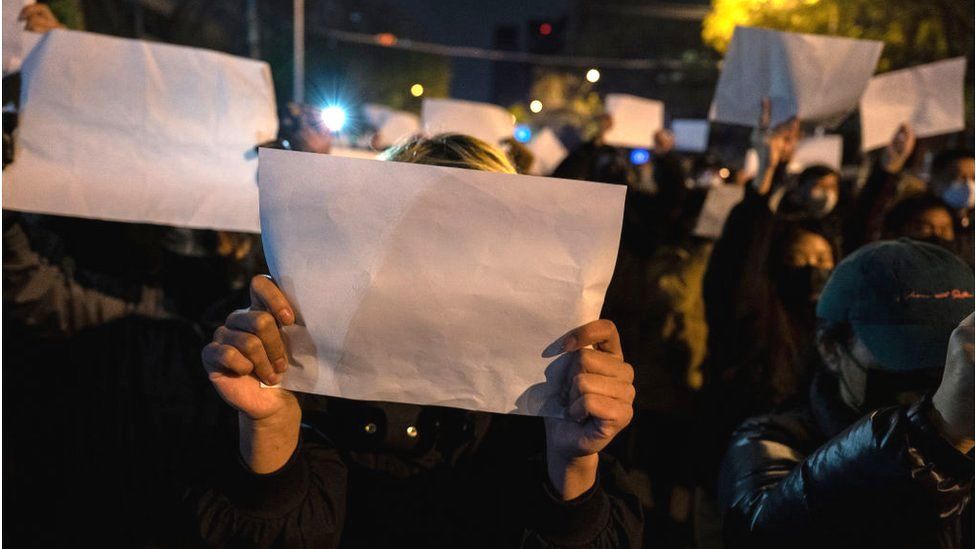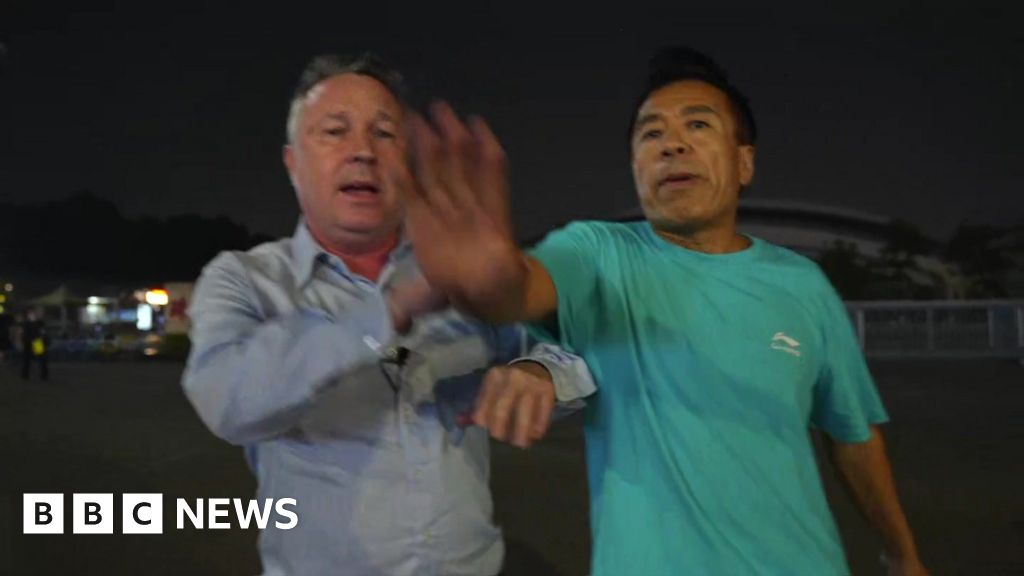ARTICLE AD BOX
 Image source, Getty Images
Image source, Getty Images
Many who took part in the November protests held up blank pieces of paper as a symbol of their frustration
By Tessa Wong & Grace Tsoi
BBC News, Singapore
As China declares victory over the pandemic, the landmark protests in November which spelled the end for zero-Covid rules have begun fading from memory.
But as the country moved on, many of those who took part in the demonstrations went missing, taken by authorities in a quietly deepening crackdown on dissenters.
Thousands rallied against restrictive Covid policies in the so-called White Paper protests, holding up blank white sheets in the dark. It was a rare show of criticism of the ruling Chinese Communist Party and its leader Xi Jinping.
Police made few arrests at the time. Now, months on, scores of those protesters are in police custody, say Chinese activists, with one group estimating there have been more than 100 arrests.
International rights groups and foreign universities have called for their release. And activist groups have published lists naming the alleged detainees. This includes those who protested in Beijing as well as other cities such as Shanghai, Guangzhou, and Nanjing.
Chinese authorities have not responded to queries on the detentions. But through interviews with friends and lawyers, the BBC was able to verify the names of 12 people arrested in Beijing.
At least five of them have been released on bail. Among those still in custody, four women - Cao Zhixin, Li Siqi, Li Yuanjing and Zhai Dengrui - have been formally arrested for "picking quarrels and provoking trouble". This is a notoriously vague charge that carries a maximum sentence of five years, and one which critics say is often used to stifle dissent.
'They are not activists'
Many of those arrested are well-educated - some attended universities in the UK and the US - and they include writers, journalists, a musician, a teacher and a financial industry professional.
Most of the Beijing detainees were part of a loose network of friends who shared a love for the arts and often met at book clubs, movie screenings and discussions.
Many of them are women, and according to reports, police have questioned them about whether they were feminists or involved in "feminist activities". Chinese authorities have increasingly cracked down on or censored women's rights activists in recent years.
Though the group was socially conscious, and some members had shown support for #MeToo figure Xianzi, they were not activists, their friends insisted.
"They are just a group of young people concerned about society… my friend is interested not just in women's rights, but also human rights and the rights of the vulnerable. This has nothing to do with feminist-related activities," said one of the detainees' friends.
On 27 November, several women from the group had joined a public vigil at Liangma River in Beijing.
The event was one of many spontaneously held across China that night to mourn the victims of an apartment fire in Urumqi which had shocked China - many believed the victims could not escape because of Covid restrictions, though authorities disputed this.
The vigil turned into a peaceful protest, with people holding blank pieces of paper that became a symbol of their frustration.
"The environment has been so oppressive for so long. They didn't think they were participating in a movement when they went. They thought it was just a way to vent their emotions," another friend said.
"They didn't clash with police or express radical opinions. So they didn't think it was serious."
Image source, Getty Images
Image caption,The protest in Beijing began as a vigil to mourn the victims of an apartment fire in Urumqi
So much so that their friends say they did little to protect their identities, given how swiftly China is known to silence protests.
It's unclear what led police to this particular group of friends, but they have reportedly tracked down protesters using surveillance cameras and facial recognition software, and searched the phones of those arrested.
One of the detainees created a Telegram group which expanded from several members to more than 60. And many of them used phone numbers registered under their real names. Two days later, some of them were questioned by police.
"We were talking on the phone when she was being taken away," said the boyfriend of one detainee. "She told me some of her friends were being taken away and lost contact. She was trying to delete stuff from her mobile phone. She was taken away before she finished deleting things."
The arrests appeared to accelerate through December and January as, one by one, more friends were detained, according to activists.
Cao Zhixin, in anticipation of her arrest, sent her friends a video of herself speaking to the camera. It came with the instructions to publish it online in the event of her disappearance.
"What we did was express our feelings in a reasonable way," Ms Cao said in the clip, which has now gone viral. "We don't want to disappear… if attending a mourning event is a crime, how much room is left for sharing our feelings?
Concern and condemnation
Several human rights groups and educational institutions are now calling for their release in a sign of growing international concern. British university Goldsmiths confirmed to the BBC that Li Siqi was a former student, and said it was "deeply concerned" for her welfare.
"We condemn in the strongest terms the suppression of free speech and urge the Chinese authorities to immediately release all those who are being detained in relation to the vigil," a Goldsmiths spokeswoman said.
She added that the university's warden had written to the Chinese ambassador to the UK, Zheng Zeguang. The Chinese embassy is yet to respond to queries from the BBC.
The University of Chicago and the University of New South Wales (UNSW) also confirmed that their former students had been arrested. A UNSW statement to the BBC called for the matter to be resolved with "due respect for legal principles and for universal human rights".
Reporters Without Borders noted that four of the detainees including Li Siqi were journalists, and called their arrests "one more chilling message to those who believe that factual information should be reported even when it contradicts the official narrative".
Human Rights Watch said the incident showed that "young people in China are paying a heavy price for daring to speak out for freedom and human rights", adding that Chinese authorities have threatened lawyers and friends who have tried to support the detainees.
Killing the chicken
Observers believe authorities want to send a signal with the arrests, or what rights activist Teng Biao calls "killing the chicken to scare the monkeys".
"They want to get who they believe are the leaders and organisers, and those who play a leading role will be severely punished," he said, adding that the Chinese authorities' instinct will be to find out if "Western hostile forces" were behind the protests.
The fact that a significant number of the detainees are women, and have been reportedly questioned about supporting feminist causes, also underscores the officials' distrust of the women's rights movement.
China in recent years has been roiled by several high-profile cases involving female victims of violence and sexual assault. These have triggered unusually harsh criticism of the authorities and have marshalled support for women's rights.
But as the movement grows, the government's response has hardened. In 2015, it cracked down on a group of women known as the Feminist Five, and since then activists say they have been increasingly censored and attacked online. An arm of the Chinese Communist Party recently condemned "extreme feminism" as an "malignant tumour".
"Maintaining 'social harmony' has always been the government's top priority, and feminist movements have always been considered a threat to the stability of the entire political system," said Altman Peng, an assistant professor at the University of Warwick who studies Chinese gender power relations.
Image source, Getty Images
Image caption,Activists hope growing international condemnation will lead to the release of detained protesters
It is unclear what lies ahead for the protesters.
Those out on bail are still liable to be charged. Those who remain in custody could be detained for several weeks as prosecutors decide whether to charge them - but that could stretch to months, if not years, in political cases, according to Mr Teng.
Their families have so far remained silent, and some have cut off contact with the detainees' friends. The BBC has learnt that one family also dropped a lawyer they had hired to fight their daughter's case, although it is not clear why.
The detainees' families are likely to stay silent given the immense pressure they are under, says veteran rights activist Yang Zhanqing.
"The police has a carrot and stick approach. Authorities would tell the families that those arrested would be released early if they kept silent. If they didn't comply, they would lose their jobs and pension."
But increasing international scrutiny of the detentions may also aid those in custody. In such politically sensitive cases, detainees can be released early or receive better treatment in jail because of external pressure, Mr Yang says.
Meanwhile, friends of the detainees, anxious and worried for their own personal safety, continue to keep tabs on the situation and share information.
Many of them live overseas and did not attend the November protests, but they fear they may be targeted anyway because of their association with the detainees - and their attempts to raise international awareness of their friends' plight.
Recently, they circulated a message from one of the detainees, relayed to them from prison. She sought to reassure her friends, making it clear the detainees were keeping their spirits up.
"[Our interrogators] keep making us feel that we are surrounded by friends who are traitors, or who have betrayed us," she said. "But I still believe we stand together."
Some names have been withheld to protect the identity of those who fear reprisal from officials.

 1 year ago
32
1 year ago
32








 English (US)
English (US)